You’ve got to hand it to David Greig. The artistic director of Edinburgh’s Lyceum Theatre has shown quite a knack for surfing the zeitgeist with his programming – and more importantly, tackling urgent political issues in a properly theatrical way.
He did it with last year’s season opener, Aeschylus’s The Suppliant Women, and its parallels with today’s refugee crises. He did it in August with Rhinoceros for the Edinburgh International Festival (a production that returns to the Lyceum in February), Zinnie Harris’s new Ionesco adaptation as a thinly veiled critique of Trump and how easily people can be seduced by poisonous ideologies.
And just a few days after a leak of government plans to discourage post-Brexit EU migration, and after Tony Blair also proposed a possible backtrack over Brexit in curbing EU immigration, Greig has done it again. What Shadows is a hard-hitting, deliberately provocative examination of identity, race and migration from Clydebank-born Chris Hannan, charting the lead-up to Enoch Powell’s 1968 "rivers of blood" speech (which Ian McDiarmid’s chilling Powell insists on playing down as his "Birmingham speech" throughout). It recounts Powell’s relationship with liberal, Quaker newspaper editor Clem Jones, along with a colliding storyline about radical Oxford academic Rose Cruickshank, hurtling towards an inevitable final confrontation with Powell and his defiantly discriminatory opinions.
To be fair, this is a Birmingham Rep production, first seen last November south of the border, and brought in (with a partially new cast) for its Lyceum outing. And What Shadows almost certainly has a more strident resonance in England – certainly in Birmingham itself, whose Brexit vote divided almost exactly 50/50, and whose theatre is just down the road from the venue where Powell delivered his notorious speech. From north of the border, its issues are no less relevant, but Hannan’s dissection of Englishness inevitably feels a bit like viewing a foreign country.
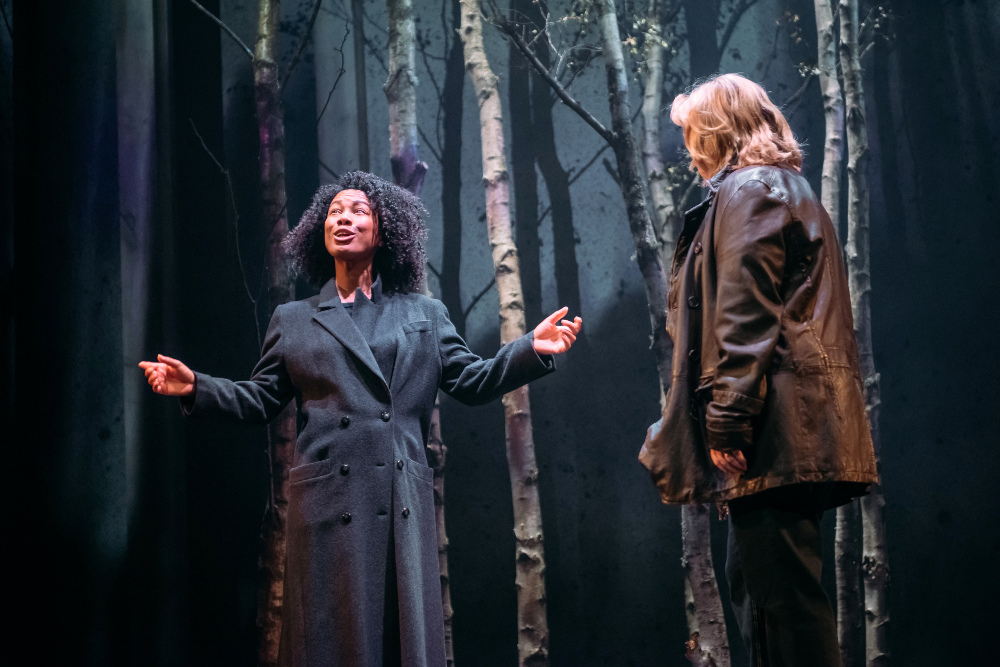 The show’s seething centre is, not surprisingly, Powell himself, in a complex, rounded performance by McDiarmid that, while capturing the man’s nasal delivery and stop-start speech rhythms, refuses facile stereotyping. Powell supported the decriminalisation of homosexuality, as we’re reminded in one of the play’s clunkier episodes, and while McDiarmid can spit self-righteous venom and fury, there’s a surprising tenderness in his fracturing relationship with old friend Jones (Nicholas Le Prevost in a solid, warm, conflicted performance). Hannan’s Powell can be petty in his corrections of English grammar, but he’s capable of some brilliantly cutting one-liners and put-downs, too, and McDiarmid’s performance is as defiant and resolute as Powell’s views themselves – as well as being the dark focus around which Hannan’s other characters orbit.
The show’s seething centre is, not surprisingly, Powell himself, in a complex, rounded performance by McDiarmid that, while capturing the man’s nasal delivery and stop-start speech rhythms, refuses facile stereotyping. Powell supported the decriminalisation of homosexuality, as we’re reminded in one of the play’s clunkier episodes, and while McDiarmid can spit self-righteous venom and fury, there’s a surprising tenderness in his fracturing relationship with old friend Jones (Nicholas Le Prevost in a solid, warm, conflicted performance). Hannan’s Powell can be petty in his corrections of English grammar, but he’s capable of some brilliantly cutting one-liners and put-downs, too, and McDiarmid’s performance is as defiant and resolute as Powell’s views themselves – as well as being the dark focus around which Hannan’s other characters orbit.
But if McDiarmid is complex and human in the central role – very much a man, not a monster – then Hannan’s supporting characters fare less well. Amelia Donkor (pictured above, with Joanne Pearce as Sofia) is a bit too lightweight and aggressive as Rose, and it’s sometimes difficult to believe this fiery, petulant figure is a revered Oxford academic. Joanne Pearce has far more gravitas as Rose’s one-time enemy Sofia, a former don who’s started a new life fishing in Scotland following her fall from academia for asserting that Powell’s speech had never been answered. Paula Wilcox, fragile but forthright as Jones's wife Marjorie, provides a determinedly human face to Hannan’s analyses of race and identity, treasuring the couple’s friendship with intellectual heavyweight Powell while increasingly abhorring his views.
In the end, though, Hannan tries to shoehorn an awful lot into his play – it’s so stuffed full of ideas, issues and characters that only a few of them get the attention they properly deserve. Jumping back and forth between 1992 and 1968, it blends together three tiers of storyline: the faltering friendship between Powell and Jones; the unlikely friendship between Rose and Sofia, on a collision course with the elderly Powell; and even the courtship and marriage between blustery Pakistani immigrant Sultan (Ameet Chana, pictured below with Amelia Donkor) and war widow Grace (Paula Wilcox doubling up), singled out by Powell as the last white woman left living in her Birmingham street. It’s significant, too, that the play’s climax comes just before the interval, with McDiarmid’s faithful recounting of the "rivers of blood" speech in its entirety – still chilling in its power and enduring relevance today – rather than what should be the incendiary encounter between Rose and Powell that closes the play.
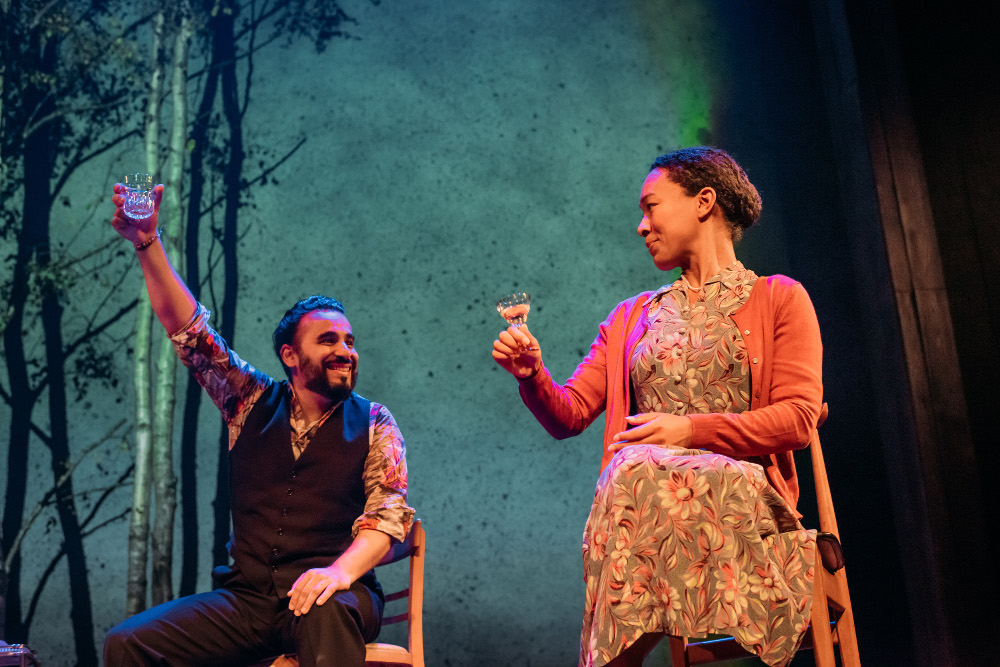 With its grove of birches, distant cries of lapwings and dappled video projections (from Louis Price), Ti Green’s elegant design hints at Powell’s vision of an England that’s all but disappeared (or never was) – “not so much a place as a grief” as he memorably describes it. Equally elegant is director Roxana Silbert’s sure command of rhythm, in a brisk production that pauses majestically for the play’s setpieces.
With its grove of birches, distant cries of lapwings and dappled video projections (from Louis Price), Ti Green’s elegant design hints at Powell’s vision of an England that’s all but disappeared (or never was) – “not so much a place as a grief” as he memorably describes it. Equally elegant is director Roxana Silbert’s sure command of rhythm, in a brisk production that pauses majestically for the play’s setpieces.
What Shadows has its flaws, certainly, but it’s a compelling, urgent piece of theatre all the same, and unashamedly provocative too – damning in its dissection of prejudice, but equally unforgiving of lazy liberal values too. Despite its profusion of ideas, Hannan’s play throws up uncomfortable truths for everyone involved, and ultimately implicates all of us in its charges of discrimination.
- What Shadows continues at Edinburgh's Lyceum Theatre until 23 September 2017
- More theatre reviews on theartsdesk




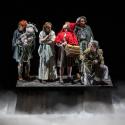

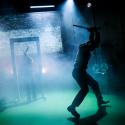

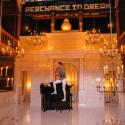
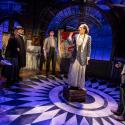
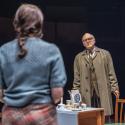


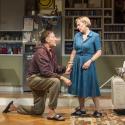
Add comment